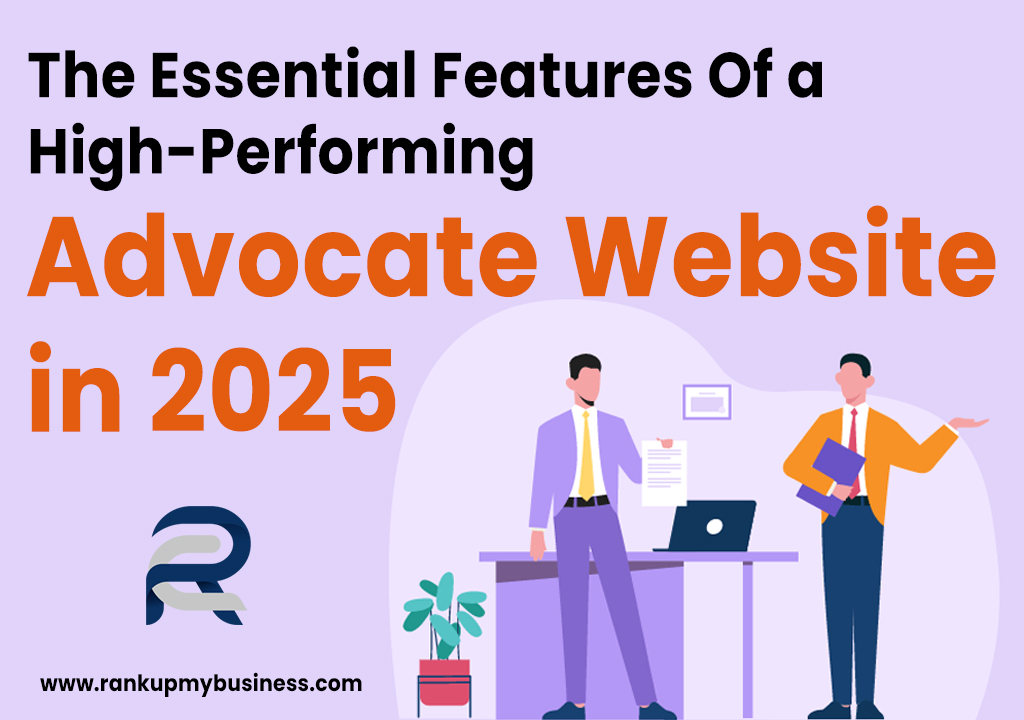In the legal profession, your website is more than just a digital storefront; it’s often the first impression clients have of your practice. A high-performing advocate website does more than showcase your services—it establishes trust, demonstrates expertise, and makes it easy for clients to take the next step. As we move into 2025, the expectations for advocate websites are higher than ever. Here are the essential features every legal professional’s website must have to stand out and succeed.
1. Responsive and Mobile-Friendly Design
With over half of all web traffic coming from mobile devices, having a responsive, mobile-friendly website is non-negotiable. Your site should:
- Automatically adapt to different screen sizes.
- Provide easy navigation with touch-friendly menus and buttons.
- Ensure quick load times to keep users engaged.
A mobile-friendly design not only enhances user experience but also improves your search engine rankings, making it easier for potential clients to find you.
2. Clear and Compelling Homepage
Your homepage is often the first interaction a client has with your brand. It should:
- Clearly state your area of expertise (e.g., family law, corporate law, criminal defense).
- Include a strong value proposition, such as “Experienced Advocates for Complex Legal Matters.”
- Feature a prominent call-to-action (CTA), such as “Schedule a Consultation Today.”
A visually appealing and straightforward homepage builds trust and encourages visitors to explore further.
3. Practice Area Pages
Clients typically search for legal services based on specific needs. Create dedicated pages for each practice area you specialize in, such as:
- Divorce and Family Law
- Criminal Defense
- Corporate Law
- Real Estate Law
Each page should include a brief overview of your services, client benefits, and a clear CTA, like “Contact Us for Expert Legal Assistance.”
4. Secure Client Portals
Privacy and security are paramount in legal matters. A high-performing advocate website should include a secure client portal where clients can:
- Upload and download sensitive documents.
- Communicate directly with their lawyer.
- Access case updates and billing information.
Ensuring data security not only protects your clients but also reinforces trust in your practice.
5. Testimonials and Case Studies
Building credibility is essential in the legal profession. Include client testimonials and case studies that:
- Highlight your successes.
- Demonstrate your expertise in handling complex cases.
- Showcase positive outcomes for past clients.
Video testimonials or written reviews with client consent can add an authentic touch.
6. Easy-to-Use Contact Forms and Scheduling Tools
Simplify the process for potential clients to reach you by integrating:
- User-friendly contact forms with fields for name, email, phone number, and inquiry details.
- Online scheduling tools that allow clients to book consultations directly through your site.
Ensure that these tools are prominently displayed on your homepage and contact page for maximum visibility.
7. Legal Blog and Resource Center
Position yourself as a thought leader by maintaining a blog or resource center. Share valuable content, such as:
- Articles explaining common legal processes.
- Tips for navigating specific legal issues.
- Updates on changes in laws or regulations.
Not only does this build authority, but it also improves your site’s SEO, helping you attract more organic traffic.
8. Search Engine Optimization (SEO)
To stand out in a competitive market, your website must rank well on search engines. Focus on:
- Using relevant keywords like “family lawyer near me” or “corporate law services.”
- Optimizing meta titles, descriptions, and headers.
- Ensuring fast load times and mobile-friendliness.
- Building backlinks from reputable sources.
SEO ensures your website is visible to potential clients searching for legal services in your area.
9. Live Chat and AI Chatbots
In 2025, instant communication is key. Adding a live chat feature or AI chatbot to your website can:
- Answer common questions about your services.
- Collect client details for follow-up.
- Provide 24/7 support for basic inquiries.
This feature ensures no lead goes unanswered, even outside office hours.
10. Compliance with Accessibility Standards
Your website should be accessible to everyone, including individuals with disabilities. Follow WCAG (Web Content Accessibility Guidelines) by:
- Providing alt text for images.
- Offering text resizing and high-contrast themes.
- Ensuring keyboard-friendly navigation.
Accessibility compliance not only broadens your audience but also demonstrates your commitment to inclusivity.
11. Analytics and Performance Tracking
Understanding how visitors interact with your website is crucial for ongoing improvement. Use tools like Google Analytics to:
- Monitor traffic sources and user behavior.
- Identify high-performing and underperforming pages.
- Track conversion rates for consultation requests.
These insights help you refine your website and marketing strategies over time.
Conclusion
A high-performing advocate website in 2025 goes beyond aesthetics; it’s about delivering value, building trust, and providing a seamless experience for clients. By incorporating these essential features, you can create a website that not only attracts clients but also positions your legal practice as a leader in your field.At Rankup My Business, we specialize in designing and developing websites tailored to the unique needs of legal professionals. Contact us today to transform your online presence and achieve your business goals.
